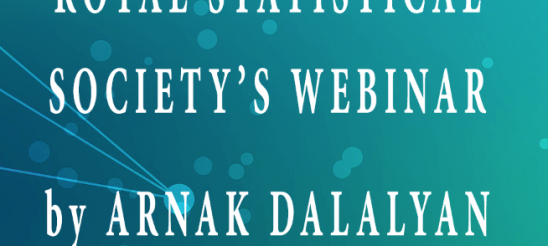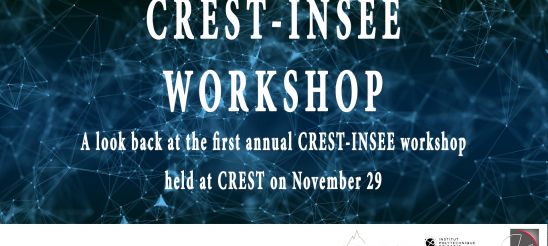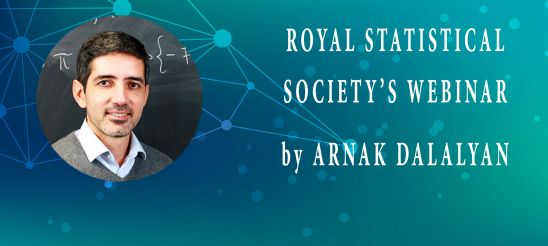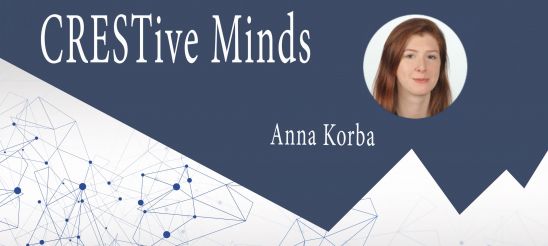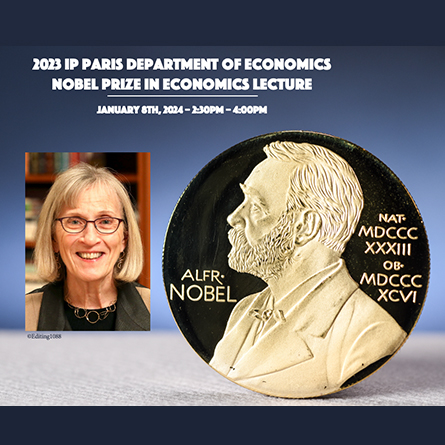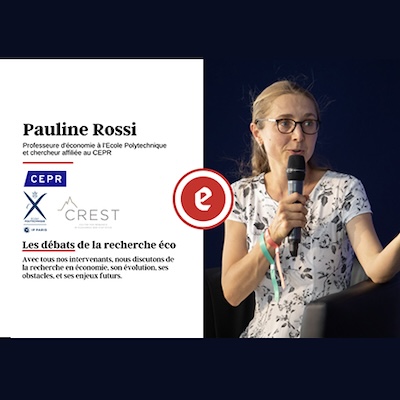On 31 October, the Royal Statistical Society webinar was devoted to Arnak S. Dalalyan’s 2017 Series B paper ‘Theoretical Guarantees for Approximate Sampling from Smooth and Log-Concave Densities’, featuring contributions from Hani Doss and Alain Durmus.
“[Dalalyan] combines techniques from convex optimisation with insights from random processes to provide non-asymptotic guarantees regarding the accuracy of sampling from a target probability density. These guarantees are notably simpler than those found in the existing literature, and they remain unaffected by dimensionality.
The findings pave the way for more widespread adoption of the mathematical and algorithmic tools developed in the field of convex optimization within the domains of statistics and machine learning.”
Showcasing significant recent papers published in the Society’s journals, the journal webinar format aims to bring authors closer to their audience in academia and industry. Impactful features of the paper are presented by the author, followed by contributions from the guest discussants.
A look back at the CREST-INSEE workshop
On Wednesday 29th November, CREST welcomed for the first time the annual CREST-INSEE Workshop. The first workshop was held at INSEE, and the aim is now to make it an annual event held every two years at each institution.
Presentations were held by scientific personalities from CREST and D2E:
• Estimating Cross-Border Tobacco Purchases in France, Mélina Hillion (D2E)
• Firm Moral Hazard in Short-Time Work, Alice Lapeyre (CREST)
• Energy Cost Pass-Through: Evidence from French Manufacturers, Raphaël Lafrogne Joussier (D2E) (joint work with Julien Martin and Isabelle Méjean)
• Welfare Effects of Increasing Transfers to Young Adults: Theory and Evidence, Marion Brouard (CREST)
• Flood Risk and Residential Mobility in France, Julie Sixou (D2E) (joint with Christine Le Thi and Katrin Millock)
• Too Constrained to Grow. Analysis of Firms’ Response to the Alleviation of Skill Shortages, Sara Signorelli (CREST) (joint work with F. Fontaine)
The purpose of this workshop is to encourage and develop exchanges and research projects between CREST and the Economic Studies Department of INSEE. In front of a large audience, high-quality presentations on economic topics of wide interest (trade, environment, public economics, …) provided an opportunity to exchange views and ideas. A real success!
Catalyzing Conversation: The Royal Statistical Society’s Webinar on Dalalyan’s Paper ‘Theoretical Guarantees for Approximate Sampling from Smooth and Log-Concave Densities'”
On 31 October, the Royal Statistical Society webinar was devoted to Arnak S. Dalalyan’s 2017 Series B paper ‘Theoretical Guarantees for Approximate Sampling from Smooth and Log-Concave Densities’, featuring contributions from Hani Doss and Alain Durmus.
“[Dalalyan] combines techniques from convex optimisation with insights from random processes to provide non-asymptotic guarantees regarding the accuracy of sampling from a target probability density. These guarantees are notably simpler than those found in the existing literature, and they remain unaffected by dimensionality.
The findings pave the way for more widespread adoption of the mathematical and algorithmic tools developed in the field of convex optimization within the domains of statistics and machine learning.”
Showcasing significant recent papers published in the Society’s journals, the journal webinar format aims to bring authors closer to their audience in academia and industry. Impactful features of the paper are presented by the author, followed by contributions from the guest discussants.
CRESTive Minds – Épisode 3 – Anna Korba
Researcher portrait: Anna Korba, assistant professor at CREST-ENSAE Paris.
What is your career path?
I pursued a three-year program in Math/Data Science at ENSAE, concurrently completing a specialized Master’s in Machine Learning at ENS Cachan. My academic journey continued with a Ph.D. in Machine Learning at Télécom ParisTech under the supervision of Stephan Clémençon.
Afterward, I gained valuable experience as a postdoctoral researcher at the Gatsby Computational Neuroscience Unit, University College London, collaborating with Arthur Gretton.
In 2020, I returned to ENSAE, joining the Statistics Department as an Assistant Professor. This trajectory has equipped me with a strong foundation in both Machine Learning and Statistics.
Did you have a statistician who particularly inspired you? If so, what were their research topics?
While I don’t have a single statistician who profoundly influenced me, I draw inspiration from the excellent mathematics taught by instructors like Arnak Dalalyan, Nicolas Chopin, Cristina Butucea and others at ENSAE. Also, I remember very well my first international conference in Machine Learning (ICML 2015 in Lille). Attending talks within the Deep Learning community, though somewhat distant from my research focus at the time, left a lasting impression. Witnessing the rapid and substantial advancements, particularly in areas like question answering, fascinated me. Conferences I attended provided exposure to influential figures—from esteemed senior professors to brilliant Ph.D. students—enriching my perspective on various statistics and machine learning subjects.
How did you get into statistics and Machine Learning in particular?
As a student I liked mathematics and coding. At ENSAE, I had the choice between quantitative finance and machine learning. With quantitative finance hiring slowing down, I embraced the rising tide of machine learning, drawn to its dynamic nature and innovative potential.
What are your research topics?
One of my primary research focuses is on sampling—approximating a target probability distribution when only partial information is available, such as its unnormalized density or samples. This versatile problem holds applications in various areas of machine learning.
In Bayesian inference, I address the posterior probability distribution over model parameters, particularly in supervised learning scenarios like determining the weights of linear or neural network regressors. Additionally, in generative modeling, my work involves learning the underlying process from a set of samples, such as true faces from celebrities, with the goal of generating new faces.
Beyond sampling, I’ve contributed to research in preference learning, structured prediction, and causality.
The framework of your field of research is fairly recent, and brings together different communities. Could you name them and explain how this collaborative effervescence has enabled a great advance?
My research intersects various communities, including experts in MCMC (Markov Chain Monte Carlo) methods, partial differential equations, dynamical systems, optimal transport (OT), and machine learning. In recent years, these traditionally independent fields have converged, fostering collaborative efforts.
A significant milestone in this convergence was a semester at Berkeley, organized by P. Rigollet, S. Di Marino, K. Craig, and A. Wilson, which brought together researchers from these diverse areas. Since then, the boundaries between these communities have become more fluid, sparking heightened interest and collaboration.
For example, I co-presented a tutorial on Wasserstein gradient flows with Adil Salim at ICML 2022, while Marco Cuturi and Charlotte Bunne presented a tutorial on OT, control, and dynamical systems at ICML 2023. These tutorials aim to introduce promising research directions and tools, providing a comprehensive panorama to a broad audience of machine learning researchers.
This collaborative effervescence has resulted in exciting progress on both theoretical and computational fronts. Researchers with expertise in multiple domains are leveraging their backgrounds to overcome challenges, offering convergence guarantees for numerical schemes and addressing practical limitations in sampling schemes, such as convergence time and local minima.
There are still many unsolved problems in the various applications. What would you like to solve or advance in your future research?
While significant strides have been made in sampling techniques inspired by optimization literature, there are still numerous unexplored aspects. My current research focus involves the incorporation of constraints into sampling methodologies. For instance, I am exploring ways to ensure fairness in predictive models by constraining the posterior distribution, making predictions independent of sensitive attributes like gender. In the realm of generative modeling, it is interesting to incorporate constraints or rewards as well, e.g. to generate images that satisfy some criterion such as brightness.
How is the intersection of fair analysis methods and Bayesian statistical methods an important advance for Machine Learning?
Bayesian inference, by providing a posterior distribution over the parameters of a model, allows for predictions with uncertainty. This is pivotal in applications where users require models capable of predicting with uncertainty, as the distribution over predictions provides a more comprehensive understanding than pointwise predictions alone. Moreover, incorporating fairness constraints in Bayesian methods holds important applications, ensuring that predictions are not influenced by sensitive attributes. This intersection enhances the interpretability and ethical considerations of machine learning models.
CRESTive Minds – Épisode 3 – Anna Korba
Researcher portrait: Anna Korba, assistant professor at CREST-ENSAE Paris.
What is your career path?
I pursued a three-year program in Math/Data Science at ENSAE, concurrently completing a specialized Master’s in Machine Learning at ENS Cachan. My academic journey continued with a Ph.D. in Machine Learning at Télécom ParisTech under the supervision of Stephan Clémençon.
Afterward, I gained valuable experience as a postdoctoral researcher at the Gatsby Computational Neuroscience Unit, University College London, collaborating with Arthur Gretton.
In 2020, I returned to ENSAE, joining the Statistics Department as an Assistant Professor. This trajectory has equipped me with a strong foundation in both Machine Learning and Statistics.
Did you have a statistician who particularly inspired you? If so, what were their research topics?
While I don’t have a single statistician who profoundly influenced me, I draw inspiration from the excellent mathematics taught by instructors like Arnak Dalalyan, Nicolas Chopin, Cristina Butucea and others at ENSAE. Also, I remember very well my first international conference in Machine Learning (ICML 2015 in Lille). Attending talks within the Deep Learning community, though somewhat distant from my research focus at the time, left a lasting impression. Witnessing the rapid and substantial advancements, particularly in areas like question answering, fascinated me. Conferences I attended provided exposure to influential figures—from esteemed senior professors to brilliant Ph.D. students—enriching my perspective on various statistics and machine learning subjects.
How did you get into statistics and Machine Learning in particular?
As a student I liked mathematics and coding. At ENSAE, I had the choice between quantitative finance and machine learning. With quantitative finance hiring slowing down, I embraced the rising tide of machine learning, drawn to its dynamic nature and innovative potential.
What are your research topics?
One of my primary research focuses is on sampling—approximating a target probability distribution when only partial information is available, such as its unnormalized density or samples. This versatile problem holds applications in various areas of machine learning.
In Bayesian inference, I address the posterior probability distribution over model parameters, particularly in supervised learning scenarios like determining the weights of linear or neural network regressors. Additionally, in generative modeling, my work involves learning the underlying process from a set of samples, such as true faces from celebrities, with the goal of generating new faces.
Beyond sampling, I’ve contributed to research in preference learning, structured prediction, and causality.
The framework of your field of research is fairly recent, and brings together different communities. Could you name them and explain how this collaborative effervescence has enabled a great advance?
My research intersects various communities, including experts in MCMC (Markov Chain Monte Carlo) methods, partial differential equations, dynamical systems, optimal transport (OT), and machine learning. In recent years, these traditionally independent fields have converged, fostering collaborative efforts.
A significant milestone in this convergence was a semester at Berkeley, organized by P. Rigollet, S. Di Marino, K. Craig, and A. Wilson, which brought together researchers from these diverse areas. Since then, the boundaries between these communities have become more fluid, sparking heightened interest and collaboration.
For example, I co-presented a tutorial on Wasserstein gradient flows with Adil Salim at ICML 2022, while Marco Cuturi and Charlotte Bunne presented a tutorial on OT, control, and dynamical systems at ICML 2023. These tutorials aim to introduce promising research directions and tools, providing a comprehensive panorama to a broad audience of machine learning researchers.
This collaborative effervescence has resulted in exciting progress on both theoretical and computational fronts. Researchers with expertise in multiple domains are leveraging their backgrounds to overcome challenges, offering convergence guarantees for numerical schemes and addressing practical limitations in sampling schemes, such as convergence time and local minima.
There are still many unsolved problems in the various applications. What would you like to solve or advance in your future research?
While significant strides have been made in sampling techniques inspired by optimization literature, there are still numerous unexplored aspects. My current research focus involves the incorporation of constraints into sampling methodologies. For instance, I am exploring ways to ensure fairness in predictive models by constraining the posterior distribution, making predictions independent of sensitive attributes like gender. In the realm of generative modeling, it is interesting to incorporate constraints or rewards as well, e.g. to generate images that satisfy some criterion such as brightness.
How is the intersection of fair analysis methods and Bayesian statistical methods an important advance for Machine Learning?
Bayesian inference, by providing a posterior distribution over the parameters of a model, allows for predictions with uncertainty. This is pivotal in applications where users require models capable of predicting with uncertainty, as the distribution over predictions provides a more comprehensive understanding than pointwise predictions alone. Moreover, incorporating fairness constraints in Bayesian methods holds important applications, ensuring that predictions are not influenced by sensitive attributes. This intersection enhances the interpretability and ethical considerations of machine learning models.
2023 Economics Nobel Prize Lecture from researchers and PhDs of the Department of Economics of IP Paris
The department of Economics of IP Paris is honored to invite you to the Nobel prize in economics lecture, open to all, on the 8th of January 2024 from 2:30pm to 4:00pm to present the contributions of this year’s recipient Claudia Goldin “for having advanced our understanding of women’s labour market outcomes”:

The lecture be given by Federica Meluzzi (PhD IPParis-CREST), Roland Rathelot (IPParis-CREST-ENSAE) and Sara Signorelli (IPParis-CREST-X).
It will be accessible to a broad audience of researchers and students.
The lecture will be in a hybrid format from both Amphi 250 in the ENSAE building and online on Zoom.
Youtube link to the recording: https://youtu.be/4eDyP5go43k
2023 Economics Nobel Prize Lecture from researchers and PhDs of the Department of Economics of IP Paris
The department of Economics of IP Paris is honored to invite you to the Nobel prize in economics lecture, open to all, on the 8th of January 2024 from 2:30pm to 4:00pm to present the contributions of this year’s recipient Claudia Goldin “for having advanced our understanding of women’s labour market outcomes”:

The lecture be given by Federica Meluzzi (PhD IPParis-CREST), Roland Rathelot (IPParis-CREST-ENSAE) and Sara Signorelli (IPParis-CREST-X).
It will be accessible to a broad audience of researchers and students.
The lecture will be in a hybrid format from both Amphi 250 in the ENSAE building and online on Zoom.
Youtube link to the recording: https://youtu.be/4eDyP5go43k
Blockchain : la technologie s’améliore mais la réglementation reste insuffisante
Article de Daniel Augot (directeur de recherche à l’india et co-responsable de la chaire Blockchain) et Xavier De Boissieu (fondateur de Quadratic Labs) pour Polytechnique Insights, 05/12/2023
Blockchain : la technologie s’améliore mais la réglementation reste insuffisante
Article de Daniel Augot (directeur de recherche à l’india et co-responsable de la chaire Blockchain) et Xavier De Boissieu (fondateur de Quadratic Labs) pour Polytechnique Insights, 05/12/2023
La nécessaire rigueur scientifique de l’économiste
Une interview de Pauline Rossi, nominée au prix du Meilleur Jeune Economiste française 2023, par Pierre Rousseaux, pour le journal Oeconomicus.

